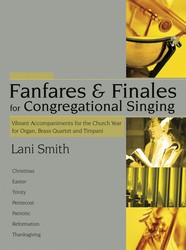- |
User Links
The Seasons
Winter reigneth over the land
Author: William Walsham How (1871)Tune: CLARENCE (Sullivan)
Published in 25 hymnals
Representative Text
1 Winter reigneth o'er the land,
Freezing with its icy breath;
Dead and bare the tall trees stand;
All is chill and drear as death.
2 Yet it seemeth but a day
Since the summer flowers were here,
Since they stacked the balmy hay,
Since they reaped the golden ear.
3 Sunny days are past and gone:
So the years go, speeding fast,
Onward ever, each new one
Swifter speeding than the last.
4 Life is waning; life is brief:
Death, like winter, standeth nigh:
Each one, like the falling leaf,
Soon shall fade, and fall, and die.
5 But the sleeping earth shall wake,
And the flowers shall burst in bloom,
And all Nature rising break
Glorious from its wintry tomb.
6 So, Lord, after slumber blest
Comes a bright awakening,
And our flesh in hope shall rest
Of a never-fading Spring.
Amen.
Source: Voices of Praise: for school and church and home #35
Author: William Walsham How
 William W. How (b. Shrewsbury, Shropshire, England, 1823; d. Leenane, County Mayo, Ireland, 1897) studied at Wadham College, Oxford, and Durham University and was ordained in the Church of England in 1847. He served various congregations and became Suffragan Bishop in east London in 1879 and Bishop of Wakefield in 1888. Called both the "poor man's bishop" and "the children's bishop," How was known for his work among the destitute in the London slums and among the factory workers in west Yorkshire. He wrote a number of theological works about controversies surrounding the Oxford Movement and attempted to reconcile biblical creation with the theory of evolution. He was joint editor of Psalms and Hymns (1854) and Church Hymns (1871). While rec… Go to person page >
William W. How (b. Shrewsbury, Shropshire, England, 1823; d. Leenane, County Mayo, Ireland, 1897) studied at Wadham College, Oxford, and Durham University and was ordained in the Church of England in 1847. He served various congregations and became Suffragan Bishop in east London in 1879 and Bishop of Wakefield in 1888. Called both the "poor man's bishop" and "the children's bishop," How was known for his work among the destitute in the London slums and among the factory workers in west Yorkshire. He wrote a number of theological works about controversies surrounding the Oxford Movement and attempted to reconcile biblical creation with the theory of evolution. He was joint editor of Psalms and Hymns (1854) and Church Hymns (1871). While rec… Go to person page >Text Information
| First Line: | Winter reigneth over the land |
| Title: | The Seasons |
| Author: | William Walsham How (1871) |
| Meter: | 7.7.7.7 |
| Language: | English |
| Copyright: | Public Domain |
Notes
Winter reigneth o'er the land. Bishop W. W. How. [Winter.] Written for and first published in the Society for Promoting Christian Knowledge Church Hymns, 1871> No. 64, and from thence has passed into numerous collections. In a few hymn-books, including Sir Josiah Mason's Birmingham Orphanage Hymnal, stanzas iii.-vi. are given as a hymn, “Sunny days are past and gone," but this mutilated text is not popular.
--John Julian, Dictionary of Hymnology (1907)
Access an additional article on the Canterbury Dictionary of Hymnology:


 My Starred Hymns
My Starred Hymns


